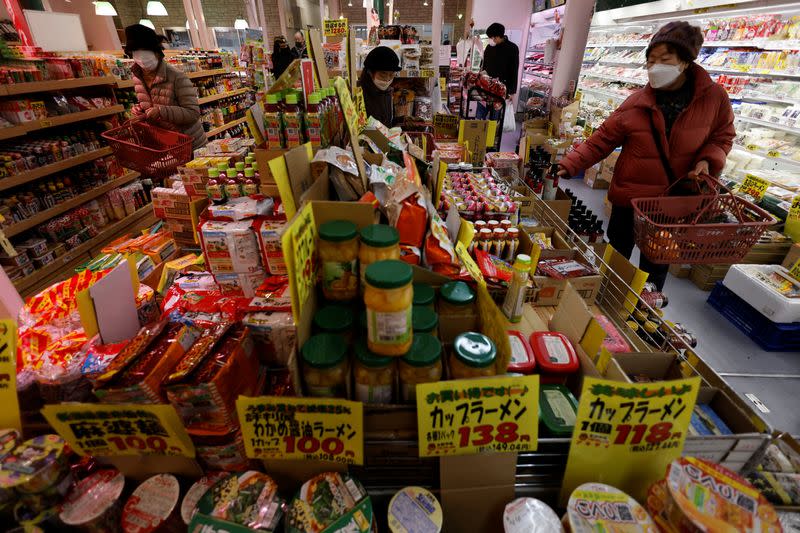Japan's consumer inflation hits 41-year high, keeps BOJ under pressure

By Takaya Yamaguchi and Leika Kihara
TOKYO (Reuters) -Japan's core consumer inflation hit a fresh 41-year high in January as companies passed on higher costs to households, data showed on Friday, keeping the central bank under pressure to phase out its massive stimulus programme.
The data underscores the dilemma policymakers face as soaring prices of fuel and daily necessities hit households, many of whom have yet to see wages rise enough to make up for the higher cost of living.
The nationwide core consumer price index (CPI), which excludes volatile fresh food but includes energy costs, was 4.2% higher in January than a year earlier, matching a median market forecast and accelerating from a 4.0% annual gain in December.
January's rise was the fastest since September 1981, when fuel costs spiked due to the Middle East oil crisis and hit Japan's import-reliant economy.
Core consumer inflation has now exceeded the Bank of Japan's 2% target for nine straight months, mostly reflecting persistent rises in fuel and raw material costs, the data showed.
"Inflation will probably peak in January but may not fall back below the BOJ's 2% target for some time," said Yoshimasa Maruyama, chief economist at SMBC Nikko Securities.
"But there are questions as to whether the rise in inflation will be sustainable, as it is still driven largely by food and fuel costs," he said.
Incoming Governor Kazuo Ueda faces a challenge in sustaining the BOJ's yield control policy, which has come under attack by markets betting strong inflation will force the bank to raise interest rates.
Speaking in parliament, Ueda said the BOJ must maintain ultra-low rates as the recent acceleration in inflation is driven largely by rising raw import costs, rather than strong demand.
"Japan's trend inflation is likely to rise gradually. But it will take some time for inflation to sustainably and stably achieve the BOJ's 2% target," he told a lower house confirmation hearing on Friday.
Upon approval by parliament, Ueda is expected to succeed incumbent Haruhiko Kuroda when his term ends in April. At Ueda's debut policy meeting on April 28, the BOJ will release for the first time its inflation forecasts extending to fiscal 2025.
Japan's economy averted recession in the fourth quarter of last year but rebounded much less than expected as business investment slumped.
While private consumption is holding up against headwinds from rising living costs, uncertainties over the global economic outlook will weigh on Japan's delayed recovery from the scars of the COVID-19 pandemic, analysts say.
(Reporting by Takaya Yamaguchi and Leika Kihara; Additional reporting by Tetsushi Kajimoto; Editing by Lincoln Feast, Bradley Perrett and Kim Coghill)

 Yahoo Finance
Yahoo Finance 